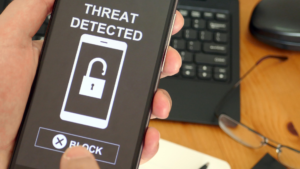Imagine a scene from the critically acclaimed film “The Imitation Game” – a race against time, set against the backdrop of World War II. Alan Turing, portrayed brilliantly by Benedict Cumberbatch, is frantically working with his team to decode the seemingly unbreakable Enigma machine used by the Nazis. This moment in history was not just about decoding messages; it was about the birth of modern computing and a turning point in the war.
Much like Turing’s breakthrough, today we stand on the brink of a new era in computing – one that promises to redefine our approach to cybersecurity in ways we have yet to fully comprehend. This era is marked by the rise of quantum computing, a technology so powerful that it challenges our fundamental methods of encryption and data protection.
As Turing’s early computing efforts laid the groundwork for the digital age, today’s quantum computing developments are setting the stage for a quantum age. But with great power comes great responsibility – and in the case of quantum computing, a significant challenge to the very fabric of cybersecurity.
The dawn of quantum computing heralds a transformative era in the digital world, especially in the realm of cybersecurity. As this nascent technology gradually moves from theoretical exploration to practical application, its implications for data security and encryption are profound and far-reaching. This blog goes deep into the evolution of cybersecurity in the quantum age, outlining the challenges, opportunities, and strategic shifts needed to adapt to this revolutionary change.
The Quantum Paradigm:
Quantum computing, a field that exploits the peculiarities of quantum mechanics, marks a significant departure from classical computing. While traditional computers use bits as the basic unit of information, quantum computers utilize qubits1. This shift allows quantum machines to process and analyze data at speeds that are exponentially faster than the most advanced supercomputers today.
Opportunities Unlocked by Quantum Computing:
- Revolutionized Encryption Techniques: Quantum computing introduces advanced cryptographic methods. Quantum Key Distribution (QKD), for instance, promises a level of encryption that is theoretically unbreakable, leveraging the principles of quantum mechanics. Tech Target explains QKD2 as a secure communication method for exchanging encryption keys only known between shared parties. It uses properties found in quantum physics to exchange cryptographic keys in such a way that is provable and guarantees security.
- Advanced Threat Detection: The superlative computational abilities of quantum computers enable them to sift through massive datasets, identifying and neutralizing cyber threats with unprecedented efficiency.
Challenges Posed by Quantum Computing:
- Vulnerability of Current Encryption: The very power of quantum computers poses a significant threat to existing cryptographic standards. Algorithms like RSA, which secure much of today’s internet, could potentially be broken in seconds by quantum algorithms. This paper3 Tufts University, discusses the threat of quantum computing to RSA and other popular encryption methods.
- The Race for Quantum-Resilient Cryptography: As quantum computing becomes more accessible, there’s an urgent need for the development of encryption methods that can withstand quantum attacks.
Recent Developments and Milestones:
- IBM’s Quantum Ambitions: IBM has been at the forefront of quantum computing research4, with plans to build a 1,000-qubit quantum computer.
- Google’s Quantum Breakthrough: Google claimed a major milestone, achieving what’s known as ‘quantum supremacy’5, by performing calculations in 200 seconds that would take the fastest supercomputers millennia.
- Global Initiatives: Recognizing the impending quantum revolution, governments worldwide have initiated programs like the US National Quantum Initiative6, aimed at accelerating quantum research and application.
The Road to Quantum Readiness:
- Transitioning to Quantum-Resistant Cryptography: Organizations must start adopting quantum-resistant algorithms to protect their data against future quantum threats.
- Investing in Education and Skills: Preparing the cybersecurity workforce for the quantum era is crucial, necessitating education and training in quantum computing.
- Fostering Collaborations: Developing quantum-safe cybersecurity measures calls for joint efforts across government, academia, and industry.
Quantum Computing and Its Impact on Cybersecurity Practices:
The entry of quantum computing into the cybersecurity domain isn’t just an upgrade – it’s a complete overhaul. Traditional cybersecurity practices, reliant on current cryptographic standards, face obsolescence in the quantum era. This necessitates a fundamental rethinking and redesigning of security protocols.
Developing Quantum-Safe Algorithms:
The race to develop algorithms immune to quantum attacks is gathering pace. Post-quantum cryptography is becoming a field of intense research, focusing on creating encryption methods that can survive the quantum onslaught. The challenge lies in devising algorithms that are secure, efficient, and can be integrated into existing digital infrastructure with minimal disruption.
The Role of AI in Quantum Cybersecurity:
Artificial Intelligence (AI), combined with quantum computing, offers promising prospects in cybersecurity. AI algorithms, powered by quantum computing, can predict, detect, and respond to cyber threats with unparalleled precision and speed. The synergy of AI and quantum computing could lead to the development of intelligent, self-learning cybersecurity systems capable of outmaneuvering even the most sophisticated cyber threats.
Ethical Considerations and Policy Implications:
The quantum leap in computing power also raises significant ethical and policy questions. Issues of privacy, data protection, and digital rights come into sharper focus in the quantum age. Policymakers and regulatory bodies will need to balance the benefits of quantum computing with the potential risks it poses to individual and collective security.
Preparing for the Quantum Future:
As quantum computing reshapes the cybersecurity landscape, staying ahead requires vigilance, adaptability, and foresight. Organizations must actively engage with the evolving quantum narrative, investing in research, technology, and human capital. Building quantum resilience is not just about technology; it’s about cultivating a culture of continuous learning, innovation, and collaboration.
Conclusion:
As identified in this overview7 – “Quantum-based technologies have already transformed society and the American economy. Examples include the Global Positioning System (GPS) for navigation, Magnetic Resonance Imaging (MRI) for medical imaging, semiconductors for computer chips, and lasers for telecommunications. Quantum information science (QIS) holds promise for another revolution in technology, with new, more powerful approaches to computing, networking, and sensing.”
The quantum era is set to redefine the boundaries of computation and cybersecurity. As we stand on the cusp of this revolutionary shift, the challenge for businesses, governments, and individuals is to embrace the change, mitigate the risks, and harness the immense potential of quantum computing. The journey from conventional cybersecurity to quantum-readiness may be complex, but it is essential for securing our digital future in an increasingly.
Discover the unstoppable power of DEFEND and PlurilockAI, the ultimate AI-generated tools that crush security threats.
Get in touch with sales@aurorait.com or call (888) 282-0696 to experience the unmatched protection that Aurora, a proud member of the Plurilock family, delivers through these groundbreaking solutions.
References:
- https://www.quantum-inspire.com/kbase/what-is-a-qubit/
- https://www.techtarget.com/searchsecurity/definition/quantum-key-distribution-QKD
- https://www.cs.tufts.edu/comp/116/archive/fall2015/zkirsch.pdf
- https://www.ibm.com/quantum/technology
- https://techcrunch.com/2022/08/05/googles-quantum-supremacy-usurped-by-researchers-using-ordinary-supercomputer/
- https://www.quantum.gov/
- https://www.quantum.gov/about/#OVERVIEW




